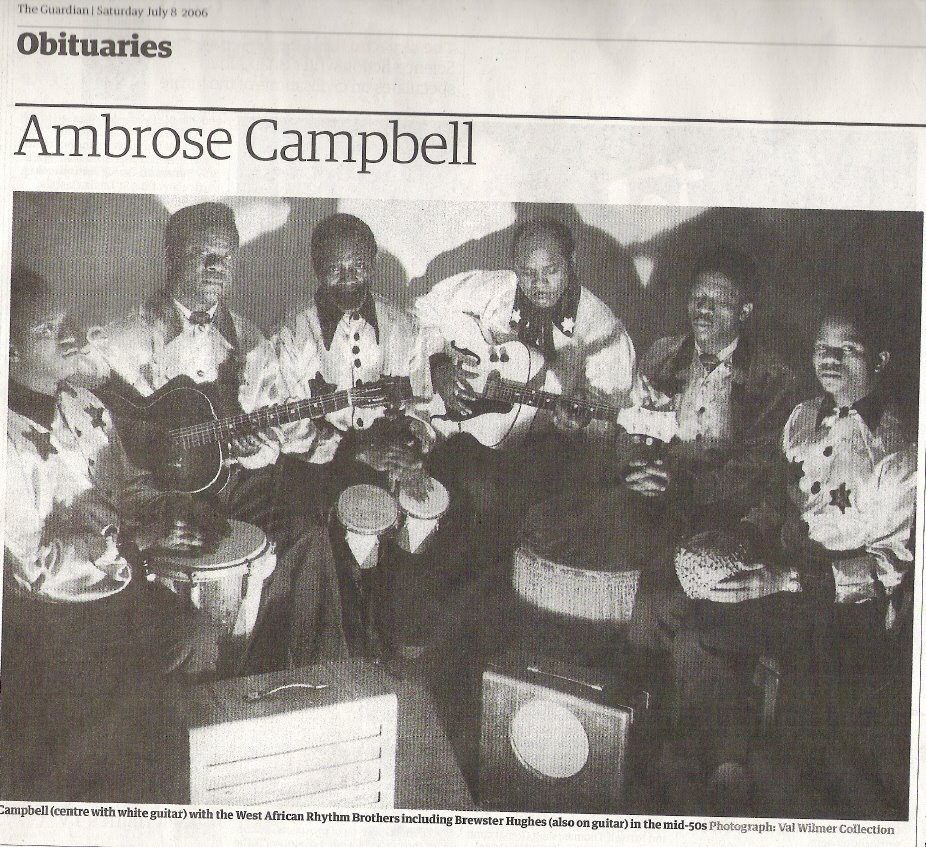Born Oladipupo Adekoya Campbell into a strict Nigerian family, Ambrose Campbell found himself on a ship during World War 2 working for firemen plying Liverpool and back. His job was to carry coal below the deck for the firemen, a seemingly easy but dangerous job that would find Oladipupo seeking refuge on another ship and settling in the UK.
He took up the name Ambrose, which was his nickname back home in Nigeria, to have a more English name and a new identity in a new country.

Before finding himself in the UK, Ambrose lived with his family in Lagos. His father was a well known and respected preacher who brought his family up in strict Western and Christian style. At a very young age, Ambrose showed an interest in music and began to sing with the church choir. He gained popularity among his peers for his great voice and soon gained the nickname Ambrose. His dedication to the church through music pleased his father but that did not last long.

When Ambrose was old enough to move around town alone, he found his way to local drinking spots where palm wine was sold and its accompanying music was played by peasant farmers and traders.
Palmwine music was traditional music highly shunned by Nigeria’s new generation of Christians at the time. After a while of admiring the music, Ambrose learnt how to play the chords on the Guitar for palm wine music and soon began performing with small groups for a free drink or some money.
After discovering his son’s new ways, his father was very displeased and against secular music and disowned Ambrose throwing him out of the house. Luckily for him, Ambrose was taken in by Nigerian politician Herbert Macaulay and worked as a printer for him while still performing his music. After a while, he met Brewster Hughes and performed with him in his Jollys Boys Orchestra in several clubs and pubs.
In 1940, Ambrose began working on the cargo ship to Liverpool. On the second trip to Liverpool from Nigeria, the cargo ship was attacked on the Atlantic. Ambrose and a few others managed to escape onto another boat and made it to Liverpool where he settled.
Ambrose moved to London where a small Nigerian community was and lived with new friends. It was there that he made a name as a musician performing African music. In his first attempt to establish himself as a musician, Ambrose formed a band but his band members soon left after several attacks from young racists.
Forming a new band in 1944, Ambrose gained tougher skin and became very popular among the black community in the UK. His breakthrough came in 1945 just at the end of the World War when he was performing at
Trafalgar Square and a huge crowd came to join him celebrate. From then on, he gained a huge audience.
In 1946, Ambrose and Brewster Hughes formed a professional band naming it the West African Rhythm Brothers. The band became famous and was hired by top socialites. After a while, they became the resident band for Les Ballets Negres, the black ballet company, and toured the UK. Ambrose and his band made it to national television and he was hailed as the man from Nigeria who set up the UK’s first ever black band.
:format(jpeg):mode_rgb():quality(90)/discogs-images/R-9557201-1482711791-5389.jpeg.jpg)
In 1952, they became a resident band for the Abalabi club in Soho. During that time, Ambrose mixed his music with Caribbean music and played with several bands in the UK and often had white bands open for him. With the Caribbean population growing in the UK, he added a few Caribbeans to his band which gained him more popularity.
:format(jpeg):mode_rgb():quality(90)/discogs-images/R-6035359-1433560653-9658.jpeg.jpg)
Ambrose’s popularity carried on till the 1980s. In the 1960s he formed his own band and toured Europe becoming a household name in Germany and Italy. He went on to establish a production company in Italy, released several albums and became a sensation in the U.S. in the 1970s.
Ambrose settled in the U.S. for a while and moved back to the UK in 2006 where he lived until he died in 2006 at the age of 86.

For his contribution to the music industry in Africa, Ambrose Campbell is celebrated as the father of African Popular Music who paved way for several African and Caribbean musicians in Europe to establish themselves. He is not only the father of Nigerian modern music but the father of African modern music who started during World War II.










